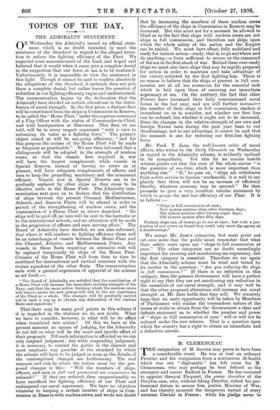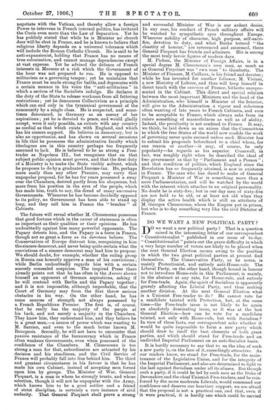M. CLEMENCEAU. T HE resignation of M. Sarrien may prove to
have been a considerable event. He was at best an ordinary Premier, and his resignation from a continuous ill-health which was not " diplomatic " has left room for M. Clemenceau, who may perhaps be best defined as the strongest and sanest Radical in France. He has ventured to appoint General Picquart, the pre= chevalier of the Dreyfus case, who, without liking Dreyfus, risked his pro- fessional future to secure him justice, Minister of War, and has thereby incurred the dangerous hatred of every extreme Clerical in France ; while his pledge never to negotiate with the Vatican, and thereby allow a foreign Power to intervene in French internal politics, has irritated the Curia even more than the Law of Separation. Yet he has publicly stated that while he is Minister no church door will be shut in France, and he is known to believe that religious liberty depends on a universal tolerance which will include the Roman Catholic Church. He is said to be anti-expansionist, holding that France has no means of true colonisation, and cannot manage dependencies except at vast expense. Yet he advised the defence of French interests in Morocco at a risk which the Government of the hour was not prepared to run. He is opposed to militarism as a governing temper ; yet he maintains that France must be made strong for battle, and deprecates with a certain menace in his voice the " anti-militarism " in which a section of the Socialists indulge. He declares it the duty of the State to release workmen from all fettering restrictions ; yet he denounces Collectivism as a principle which can end only in the tyrannical government of the community by a single class. He is suspected, and some- times denounced, in Germany as an enemy of her aspirations ; yet ho is devoted to peace, and would gladly accept, were it only possible, an entente with any country as cordial as that which exists with England, and which has his sincere support. He believes in democracy, but is also an opportunist, and has shown on several occasions in life that he possesses the administrative faculty which ideologues are in this country perhaps too frequently assumed to lack. He is believed to be as strong a Free- trader as Napoleon III., but recognises that on that subject public opinion must govern, and that the first duty of a Ministry is to make the State visibly solvent, which he proposes to do by a graduated Income-tax. He, perhaps more easily than any other Premier, may carry that unpopular proposal, for he has for years possessed a sway over the Chambers, derived partly from his eloquence, but more from his position in the eyes of the people, which has made him, truth to say, the dread of many successive Governments. Whenever he has become decidedly opposed to its policy, no Government has been able to stand up long, and they call him in France the " breaker " of Cabinets.
The future will reveal whether M. Clemenceau possesses that good fortune which in the career of statesmen is often as important as their qualities or their opinions. He has undoubtedly against him many powerful opponents. The Papacy detests him, and the Papacy is a force in France, though not so great a force as its devotees believe. The Conservatives of Europe distrust him, recognising in him the sincere democrat, and never being quite certain what the convictions of a sincere democrat may lead him to propose. We should doubt, for example, whether the ruling group in Russia can honestly approve a man of his convictions ; while Berlin undoubtedly regards him with a certain scarcely concealed suspicion. The inspired Press there already points out that he has often in the Aurore shown himself an opponent of German aspirations, asking if he will contend with Berlin and the Papacy together ; and it is not impossible, although improbable, that the Court of Germany may from the first throw serious obstacles in his way. On the other hand, he has some sources of strength not always possessed by a French Republican Premier. The first is, of course, that he really has the majority of the people at his back, and not merely a majority in the Chambers. They know him, they understand him, and they believe he is a great man,—a source of power which was wanting to M. Sarrien, and even to the much better known M. Bourgeois. Secondly, he will not have to encounter that passive resistance of the bureaucracy which in France often weakens Governments, even when possessed of the confidence of the Chambers. M. Clemenceau is too strong a man for that, subordinates are attracted by his decision and his steadiness, and the Civil Service of France will probably fall into line behind him. The third and greatest circumstance in his favour is that he has made his own Cabinet, instead of accepting men forced upon him by groups. The Minister of War, General Picquart, is a man in whom he strongly trusts, and whose selection, though it will not be unpopular with the Army, which knows him to be a good soldier and a friend of strict discipline, is certainly a rare instance of civil audacity. That General Picquart shall prove a strong and successful Minister of War is our ardent desire. In any case, his conduct of French military affairs will be watched by sympathetic eyes throughout Europe. Wherever nobility of character, high purpose, self-sacri- fice, devotion to duty, and what Burke termed " the chastity of honour," are reverenced and esteemed, there General Picquart has friends and admirers. His is among the most truly heroic figures of modern days. M. Pichon, the Minister of Foreign Affairs, is in a special degree M. Clemenceau's own man, as much so as General Freycinet was " own man " to Gambetta. The Minister of Finance, M. Caillaux, is his friend and devotee ; while he has invented for another follower, M. Viviani, a new Ministry of Labour, and thus will keep himself in direct touch with the ouvriers of France, hitherto unrepre- sented in the Cabinet. This direct and special relation between the most important Ministers and the head of the Administration, who himself is Minister of the Interior, will give to the Administration a vigour and coherence often wanting of late years to French Cabinets, and sure to be acceptable to France, which always asks from its rulers something of masterfulness as well as of ability. Indeed, the peculiarity is not confined to France. It may, we think, be laid down as an axiom that the Committees to which the free States of the world now confide the work of governing never quite succeed unless each Minister has to submit his proposals beforehand to a chief whom, for one reason or another—it may, of course, be only popularity—he regards as his superior. Cromwell, in fact, was roughly right when be described the ideal of free government as that by " Parliament and a Person " ; and that condition of politics, which England since the Revolution has so frequently attained, is now in existence in France. The man who has dared to make of General Picquart a Minister of War is something more than a mere Parliamentarian, and will be watched by the world with the interest which attaches to an original personality. No doubt he is sixty-five ; but in our day men of sixty-five are not held to be old, or at least not old when they display the active health which is still an attribute of M. Georges Clemenceau, whom the Empire put in prison, but who is to-day something very like the civil Dictator of France.















































 Previous page
Previous page